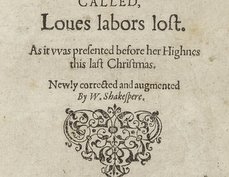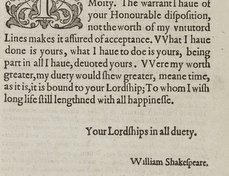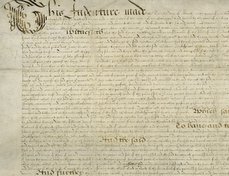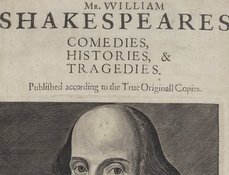Images reproduced by permission of The National Archives, London, England.
Terms of use
The National Archives give no warranty as to the accuracy, completeness or fitness for the purpose of the information provided.
Images may be used only for purposes of research, private study or education. Applications for any other use should be made to The National Archives Image Library, Kew, Richmond, Surrey TW9 4DU, Tel: 020 8392 5225 Fax: 020 8392 5266.
Document-specific information
Creator: Court of Requests
Date: 1619-1620
Repository: The National Archives, Kew, UK
Call number and opening: REQ 1/29, p.598
View online bibliographic record
In 1606 John Witter of Mortlake, Surrey, married Anne Phillips, widow of Augustine Phillips, a member of the King’s Men who had died in 1605. Though Anne was both a beneficiary and the executrix of her deceased husband’s estate, a clause in Phillips’s will stipulated that, should she re-marry, the executorship of the estate, including the Phillips share in the Globe, would pass to his overseers John Heminges, Richard Burbage, and William Slye, who were principal actors with the King’s Men, and to Timothy Whitehorn. Accordingly, in 1607, a year after Anne’s remarriage, the executorship passed to John Heminges (Playhouse Wills, p. 74). Following Anne’s death in January 1618, Witter sued Heminges and Henry Condell for her share in the Globe. The resulting lawsuit, from which eight documents survive, provides useful information on the Globe site and the Globe playhouse. One document, the Answer of Heminges and Condell specifically names William Shakespeare.
This contemporary Decree and Order Book, greatly decayed, preserves enough details of John Witter’s case against Heminges and Henry Condell to reveal that the case, which was opened on April 20, 1619 with Witter’s Complaint, continued to make its way through the courts to the end of 1619 and into 1620. There is also a later entry in the Decree and Order book, although both are difficult to date.
[This transcription is pending final vetting. Transcription based on Charles William Wallace, "Shakespeare and his London Associates, As Revealed in Recently Discovered Documents" University of Nebraska Studies, vol. 10 no. 4 (1910), 75.]
[The manuscript is badly damaged; the outer edges have rotted away.]
Termino Trinitatis Anno 17o 28o Maij Ao 17o and 52o
…
[Towchin]g the cause at the sute of Iohn Witter complainant against Iohn Heminges [and]
Henry Condall defendantes vpon the mocion of Mr Wilbraham of [councel]l
with the said complainant yt is ordered that the said defendant Heminges [having con]venyent notice of this order shall attend this court [<…>]
[<…>]t with the lease & deede of mortgag[e] mencioned in the
[bill of Complaint] shall then at his perill shewe cause whie the [<…>]
[<…> deli]uered into the safe custody of this court to[<…>]
[<…>] maiesties Councell in this court shalbe thou[ght meet <…>]
[<…>] layde out vpon the said mortgage being by the said [<…>]
[<…> Cond]ell in his answere to be receaued (?) at the day [<…>]ith
[<…>] due for the same And further it is ordered that
[<…>] the said defendantes answere shalbe referred to the
[<…>] retayned, who is requyred by this court to [<…>]
[<…>] impertinencie thereof and to report his opinion
[<…>] and therevpon the further order of this court
[shall proceede as to ius]tice shall apperteyne.
...
To learn more, read Alan H. Nelson's essays on lawsuits in Shakespeare's England, and the 1599 lease of the Globe playhouse site.
Written by Alan H. Nelson
Sources
Charles William Wallace, "Shakespeare and his London Associates, As Revealed in Recently Discovered Documents" University of Nebraska Studies, vol. 10 no. 4 (1910), 75.
Last updated May 14, 2018










